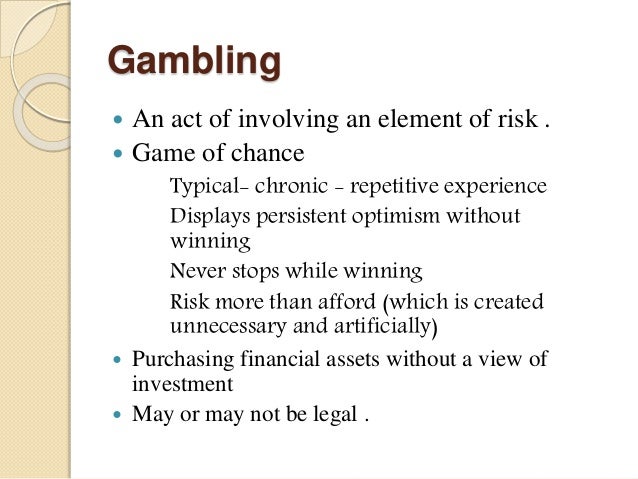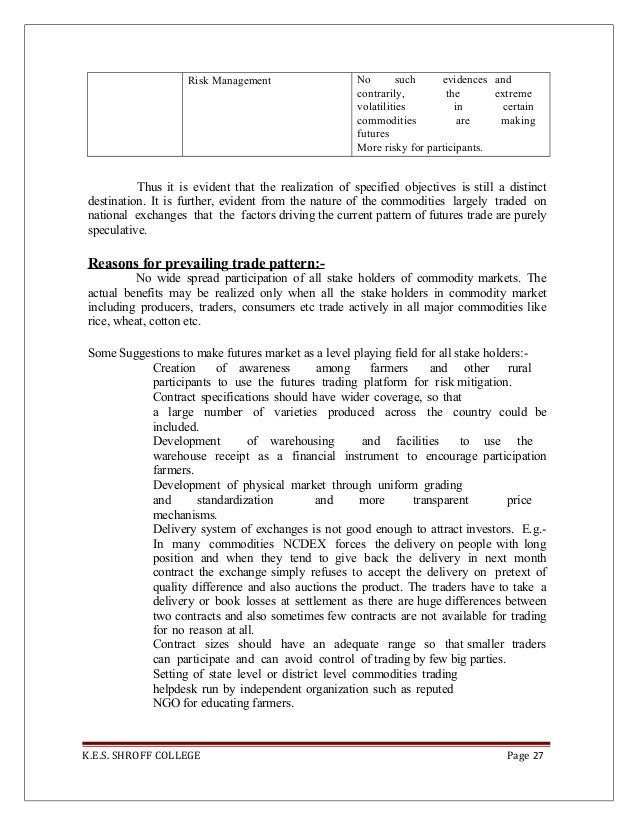Speculation In Futures Markets Is Pure Gambling
The minimum deposit for other offers that require a deposit will be clearly communicated. Maximum bonus offered will be communicated in the details Speculation In Futures Markets Is Pure Gambling Which Is Not In The Public Interest of each specific promo. 'Speculation in futures markets is pure gambling. It is not in the public interest to allow speculators to trade on a futures exchange.' Discuss this viewpoint. “Speculation in futures markets is pure gambling. It is not in the public interest to allow speculators to trade on a futures exchange.” Discuss this viewpoint. Speculators are important market participants because they add liquidity to the market. However, contracts must be useful for hedging as well as speculation.
How Short-Term Spread Bettors Make Money
For those that don’t quite fit into the mindset of the ultra-short-term day trader, all hope is far from lost. Those that think short-term don’t need the restriction of a day, and many traders in this scenario find opportunities in slightly longer short-term positions that meet a good mix between profit potential and the presence of risk. While the fundamentals of why they trade short-term remain constant, more flexible short-term traders have a range of devices at their disposal to wedge a profit from the markets.
How They Trade
Short-term spread bet traders look to make profits in an environment where the corresponding risks are less severe. The time frame manipulation of traders highlighting their durational preferences is strategic, with preference shown to positions that come and go over a period too short to allow serious, capital-threatening damage to occur. While this is good logic, it’s important to bear in mind that trading short-term means you invariably have to trade more often to achieve the same ends as with longer term trades. In this respect, the trade off is one between lower risks or greater per transaction profits.
What They Trade
Daily rolling bets can be used beyond the strict parameters of day trading by other short and medium term traders. A spread betting position in daily rolling bets is flexible enough to give full control overnight, but also suitable for a variety of short term trading purposes and therefore it is commonly used towards trading markets over this kind of time frame. For an alternative, with a slightly longer-term view, monthly futures bets are a good option for those trading over the short term because the double layer of leverage in the transaction makes for volatile, potentially profitable trading over the short to medium term.
Advantages of Short-Term Trading
Short term trading is considered by many new traders to be a less risky way of getting stuck in to the markets, and in large part this carries some merit. The less time your capital is exposed to the market on a single transaction, the more unlikely it will be that you’ll suffer total market collapse and lose heavily. This is known as market risk, a threat to capital which is reduced by the nature of being involved in positions over a shorter time frame. For those moving beyond the day-long timeframe, or beyond a couple of days, daily rolling bets can be substituted for more flexibly timed instruments to remain both cost-effective and optimised for short term trading.
Disadvantages of Short-Term Trading
Short-term traders generally have to work harder to generate comparable returns. The short-term nature of transactions mean there is less time and scope for profits to be made. This translates as more thinking time, more research and more planning, to achieve similar levels of results. A short-term approach should also be considered more expensive on a per trade basis, given that spreads are proportionately more substantial a cost than with larger, longer-term trades.
How Mid-Term Spread Bettors Make Money
The short term doesn’t suit everyone, and many traders prefer to cast their minds and their trading projections over a slightly longer-term field, to take advantage of wider trends without tying up their capital for an eternity. The medium term in spread betting can prove fertile ground for a range of trading and investment opportunities, and in the eyes of some traders represents the optimum mix between lower profit, lower risk short term trading and its polar opposite at the other end of the spectrum.
How They Trade
Speculation In Futures Markets Is Pure Gambling Winnings
Those trading for the medium term tend to look at opportunities over the course of a couple of days, ranging up to monthly and even in some cases quarterly bets. Medium-term territory tends to be most readily exploited in situations where traders are looking to generate larger profits from each transaction but without tying up capital or exposure for the longer term. This in practice means trades are taken on the basis of the longer term, with a view to cutting short early in order to keep on top of any market risk without dampening profit potential too significantly.
What They Trade
For traders casting an eye to the financial spread betting markets for the medium term, monthly and quarterly bets tend to offer the most suitable transactional timeframes for speculation. This translates commonly into monthly futures bets and quarterly futures bets, depending on the exact nature of the strategy being deployed. As these types of bets do not attract overnight financing, they are a more efficient structure for traders with a defined market outlook to adhere to and utilise, providing opportunities for traders across a variety of different short-term trading strategies. As an alternative to daily bets, monthly and quarterly futures bets have much wider spreads, but this is offset by the lack of financing costs to give a cost-efficient, leveraged means of accessing medium-term markets.
Advantages of Mid-Term Trading
Trading over the medium term means essentially a halfway point between short and long term trading outlooks, bringing the best of both worlds in terms of advantages. Over the medium term, positions can develop to a certain level and can take account of more fundamental shifts in market trends. At the same time, the medium term remains largely isolated from the extended market risk arising from held positions, and capital can be cycled over more opportunities through the same time period as over the course of longer-term trades. These are key advantages for traders looking towards medium term opportunities, and when combined with an effective research strategy can make it a profitable way to trade.

Disadvantages of Mid-Term Trading
Trading over a longer period of time than short-term trades is essentially a disadvantage on the market risk front, posing a further threat to capital than in short term positions. At the same time, this market risk isn’t quite entirely offset by the potential for larger returns, and as such mid-term trading strategies often fall awkwardly between these two extremes.
How Long-Term Spread Bettors Make Money
Financial spread betting isn’t traditionally thought of as a long-term trading form – in fact, for most the contrary is true, with spread betting instantly conjuring images of quickly scalped profits and fast-paced trading. For some traders, financial spread betting strategies are best deployed with a longer term outlook to enable positions to mature and reflect the more fundamental market shifts that occur over the course of month to month, or even quarter to quarter.
Speculation In Futures Markets Is Pure Gambling Money
How They Trade

The longer-term spread bettor tends to trade for large price corrections, trends and reversals, projecting results into months and even quarters in advance in order to capitalise from wider market trends. Particularly with moving average strategies and other techniques that help identify trend lines and macro-movement, long-term trading can be the most profitable form of spread betting on a per-transaction basis, simply because each position has much longer (and ideally much further) to run. However, caution is still advised with long-term trading, given the increased market risk and the potential for even more significant losses to develop over the course of the trading cycle.
Speculation In Futures Markets Is Pure Gambling Stocks
What They Trade
Trading spread betting over a longer time frame always requires alternative instruments and spread betting types. Spread betting on a day-by-day basis over any length of time is cost prohibitive. In order to afford this kind of flexibility, monthly futures bets and quarterly futures bets exist, created to give spread bettors the wiggle room to project results over a longer-term time frame. Monthly and quarterly bets don’t attract the same overnight financing charges as other positions, and as a result are designed to be used for trading over a longer-time frame. This allows traders to have more control over the markets they trade and how they trade them, to leverage opportunities over monthly, quarterly or custom time cycles.
Advantages of Long-Term Trading
Longer-term traders tend to require fewer positions in number to meet the same objectives as shorter-term traders, saving primarily on the spread costs and the research and effort burden across many different markets and position types. The longer the trading timeframe, the more scope markets have to gain points, and as a result the more each transaction can return. Traders who cast their mind long-term can afford to be less active in terms of trade management, freeing up resources and time to concentrate on developing other areas of the account and trading strategy. And with the benefit of much wider potential swings in market prices, longer term trades and instruments can deliver larger single gains.
Disadvantages of Long-Term Trading
Of course, finding long-term trading opportunities that satisfy risk/reward ratios is easier said than done. The longer a position is open, the more likely it is to run against you and cost money. A position that’s only intended for a day can only go so wrong – a longer-term trade left to go bad can cause untold damage to your capital and your trading account. Furthermore, making calls about the shift in momentum and market trends tomorrow is difficult, and forecasting next week is even harder. Next month is a minefield of variables, and next year is usually just pure speculation.